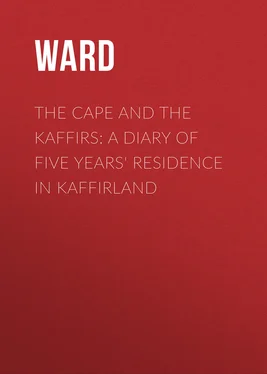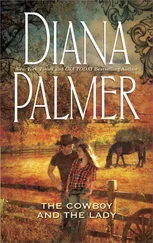Ward - The Cape and the Kaffirs - A Diary of Five Years' Residence in Kaffirland
Здесь есть возможность читать онлайн «Ward - The Cape and the Kaffirs - A Diary of Five Years' Residence in Kaffirland» — ознакомительный отрывок электронной книги совершенно бесплатно, а после прочтения отрывка купить полную версию. В некоторых случаях можно слушать аудио, скачать через торрент в формате fb2 и присутствует краткое содержание. Издательство: Иностранный паблик, Жанр: foreign_prose, История, foreign_edu, foreign_antique, на английском языке. Описание произведения, (предисловие) а так же отзывы посетителей доступны на портале библиотеки ЛибКат.
- Название:The Cape and the Kaffirs: A Diary of Five Years' Residence in Kaffirland
- Автор:
- Издательство:Иностранный паблик
- Жанр:
- Год:неизвестен
- ISBN:нет данных
- Рейтинг книги:4 / 5. Голосов: 1
-
Избранное:Добавить в избранное
- Отзывы:
-
Ваша оценка:
- 80
- 1
- 2
- 3
- 4
- 5
The Cape and the Kaffirs: A Diary of Five Years' Residence in Kaffirland: краткое содержание, описание и аннотация
Предлагаем к чтению аннотацию, описание, краткое содержание или предисловие (зависит от того, что написал сам автор книги «The Cape and the Kaffirs: A Diary of Five Years' Residence in Kaffirland»). Если вы не нашли необходимую информацию о книге — напишите в комментариях, мы постараемся отыскать её.
The Cape and the Kaffirs: A Diary of Five Years' Residence in Kaffirland — читать онлайн ознакомительный отрывок
Ниже представлен текст книги, разбитый по страницам. Система сохранения места последней прочитанной страницы, позволяет с удобством читать онлайн бесплатно книгу «The Cape and the Kaffirs: A Diary of Five Years' Residence in Kaffirland», без необходимости каждый раз заново искать на чём Вы остановились. Поставьте закладку, и сможете в любой момент перейти на страницу, на которой закончили чтение.
Интервал:
Закладка:
I cannot avoid reverting to the fact that writers have never, in their descriptions, separated the Fingoes from the Kafirs. There is no doubt that they once formed one vast nation, but are now not only distinct but opposed to each other. In advertisements relative to servants, and setting forth Government ordinances, mention is made of all the tribes of Kaffirs to the utmost limits of the known territory, also of Hottentots and Bushmen, but no reference is made to Fingoes, who differ from the Kaffirs in appearance as well as in habits.
Mr Shepstone, the Government agent, has kindly written down, from what he has gathered from them in conversation, the idea of the Kaffirs respecting their own origin. He says—
“The traditions among the native tribes on the south-eastern coast of Africa, which essay to describe the origin of the human race, are as various as the tribes themselves. Perhaps, the one most curious in its detail is the following:—It assumes the pre-existence of the sun, moon, and stars, etc, as also of our earth, with everything in it as it at present exists, with the exception of men and cattle. It then describes two chasms in the earth, from one of which emerged three descriptions of men; first, the Kaffir; second, the Bushman (the original Hottentot); and third, the white man. These are the fathers of mankind. Out of the other chasm came cattle; the greatest part of these were given to the Kaffir, and he was told they should be ‘his life and his children’s.’ The Bushman ‘was given the honey-bird,’ 8 8 A small bird, which, attracting the notice of travellers by its cry, guides them to the wild bees’ nests in trees, or clefts of rocks.
and was desired to follow it, as its fortunes should be ‘ his life and his children’s.’ The white man was shown the sea, and was told to ‘try everything.’ Another account represents the white man as having been incited by curiosity to explore the chasm whence had issued the cattle; that, after he had entered it, the mouth closed up; but that by extraordinary exertions he cleared his way out, which explains the cause of his descendants possessing such persevering ingenuity. Their different callings being thus defined, they were permitted to increase and multiply, and live in love with one another. This injunction was followed for a considerable period, when one morning, when the sun shone as brightly as usual in the heavens, one of their number was discovered motionless! speechless! cold! The utmost dismay was the consequence; all assembled to endeavour to ascertain the cause, and remedy what was felt to be a serious evil; some ran with water, to sprinkle the lifeless form; others hastened with broad-spreading leaves, to fan the rigid countenance, and every effort was made to restore their companion so far as to be able to tell the cause of such fearful apathy. All was in vain—not a ray of hope was left—despair took possession of their breasts. The form of their friend and fellow creature began to moulder.—Nothing remained at last but the more substantial parts of the person once familiar to them. Then a voice came and named it ‘Death!’ It is curious to observe,” remarks Mr Shepstone, “in all this the recognition of a superintending and benevolent power, independent of man; whereas, in every other tradition, the fortunes of the human race are represented as under the control of the good and evil spirits of their forefathers, whichever may, circumstances, predominate at the time.”—Fort Peddie, May 19th, 1843.
Part 2
Chapter I.
Five Years in Kaffirland—The Voyage Out
There was nothing very pleasant in the prospect before me of leaving England just as summer was opening her gates, and exhibiting her flower-strewn paths and fragrant hedgerows. My health was not good, and to my mode of travelling I looked forward as anything but agreeable; since a troopship can never be considered as affording even convenient accomodation for a lady, and the miseries of a sea-life must of necessity be enhanced by being shared with a crowd of fellow-sufferers of various classes.
Nevertheless, on reaching Ireland, (land of green spots and generous hearts!) my spirits rallied; my soul could not but respond to kindly sympathies and disinterested hospitality, and by the time the troopship, “Abercrombie Robinson,” arrived in Kingstown Harbour, whence we were to embark (in all upwards of 700 souls) for the Cape of Good Hope, I had shaken off my unavailing regrets in a great degree, and was prepared to meet my destiny with a fortitude worthy of a soldier’s wife,—a fortitude, indeed, earned by experience in my encounter with “perils by sea and land.”
But people now don’t care for rhymes romantic,
And I must cease to think of former years.
This, my third trip across the vast Atlantic,
Hath taught me to subdue a world of tears;
For worse than idle, on a joyous track,
Were the vain sorrow earned by looking back! – My Journal .
The inhabitants of Dublin, “in the merry month of May,” 1842, emigrated by instalments to visit the “Abercrombie Robinson,”—a ship of 1400 tons being rarely seen in Kingstown Harbour. A few short months after, she lay a wreck upon the sands of Africa, a true type of the littleness of man’s works, and of the power of Him who “blew with his winds and they were scattered.”
We embarked, and for a day or two enjoyed the balmy breezes of the summer sea as we lay in harbour. His Excellency the Lord Lieutenant came on board in the barge, to see the ship, the barge being steered by the agent, Lieutenant J.R. Black, R.N. The guns saluted, the yards were manned, bands were playing, colours flying, soldiers cheering, etc, etc. The Lord Lieutenant congratulated us on our fine prospects, and drank our healths, wishing us prosperity (and I am sure he was in earnest); and his Aides-de-Camp looked as civil as they could, considering they were very much bored: and, when we had all played at company and propriety for a given time, his Excellency left the ship, steered as before, and there was a repetition of guns firing, soldiers shouting, etc; and the people on the shore, no doubt, thought it very fine indeed.
We were better off with regard to accommodation than we had been as inmates of a transport on a former occasion, when we went to Saint Helena. Our ship was strong, apparently, as a castle, and our accommodation very superior. With the first favourable breeze we spread our canvass, and sailed out of Kingstown Harbour, hundreds cheering us from the shores of green Ireland, while our men responded to their shouts.
The voyage was dull enough, only varied by a due quantity of parades, roll-calls, mustering of watches, with a running accompaniment of bugles, bagpipes, and drums. Our party, in general, was an agreeable one; the average quantity of ill-humour being small in proportion to our number, and therefore falling harmlessly enough on those who were willing to make the best of every thing. We paid by the way a visit to Madeira.
The view of this beautiful island (or rather of Funchal, the principal town) in some magazine, is the best representation of it I have seen. The town is prettily situated, but deplorably spoiled by the narrowness of its streets. 9 9 An inhabitant of Madeira gave an excellent reason for this apparent fault, viz, that the houses being built closely together afforded a shade from the sun that wide streets would not have have done.
I was, unfortunately, too much indisposed,—suffering as I was from the effects of a species of scarlet fever,—to visit the interior of the island; but even the outskirts of the town were most refreshing. There was a sound of running waters, a waving of green boughs, scenting the air with their fragrance, and making me imagine myself, in my weak state, fanned by the kindly wings of unseen angels. The last fortnight on shipboard had been passed in great discomfort: heavy sickness at all times is a severe tax on our patience, but at sea, in a narrow cabin, where one’s weak voice is often drowned by the creaking of masts, the dashing of the waves, and the hoarse calls of the seamen, it is beyond all conception to those who have not similarly suffered. My little tour in my tiny palanquin at Madeira was, therefore, most delicious. First I lingered in the square, under the trees, looking at the 11th regiment of Portuguese troops on parade. Well-dressed, well drilled, well appointed, and withal well looking, they had every appearance of being an efficient body of men. Then their harmonious band (no one instrument being heard distinctly above another) exceeded in sweetness any regimental band I ever heard in our service. The big drum, instead of being struck with violence, merely swelled in accompaniment; and, when the fifes took up the strain, the brazen instruments lowered their tone in perfect unison with the powers of the lesser ones. This over, I was carried onwards through alleys green with the foliage of the graceful vine; the distant hills made me long for refreshing landscapes and “spicy gales,” but these were denied me, and my bearers carried me into a garden adjoining a house which we understood belonged to the English Consul, but which we found was tenanted by Lady Harriet D—, who was residing at Madeira for the benefit of her children’s health. On learning this, as we were about to retire, a man-servant followed, begging us, in his lady’s name, to proceed. We did so, and under a group of trees we discovered Lady Harriet, surrounded by books and work, and apparently intent on the instruction of two sable pupils. The sound of her voice as she rose to meet me, bespoke her pity for my pale looks and exhausted frame, and the refreshment we accepted at her ladyship’s hospitable hands enabled me to endure the fatigue of returning to the town better than I should otherwise have done.
Интервал:
Закладка:
Похожие книги на «The Cape and the Kaffirs: A Diary of Five Years' Residence in Kaffirland»
Представляем Вашему вниманию похожие книги на «The Cape and the Kaffirs: A Diary of Five Years' Residence in Kaffirland» списком для выбора. Мы отобрали схожую по названию и смыслу литературу в надежде предоставить читателям больше вариантов отыскать новые, интересные, ещё непрочитанные произведения.
Обсуждение, отзывы о книге «The Cape and the Kaffirs: A Diary of Five Years' Residence in Kaffirland» и просто собственные мнения читателей. Оставьте ваши комментарии, напишите, что Вы думаете о произведении, его смысле или главных героях. Укажите что конкретно понравилось, а что нет, и почему Вы так считаете.












